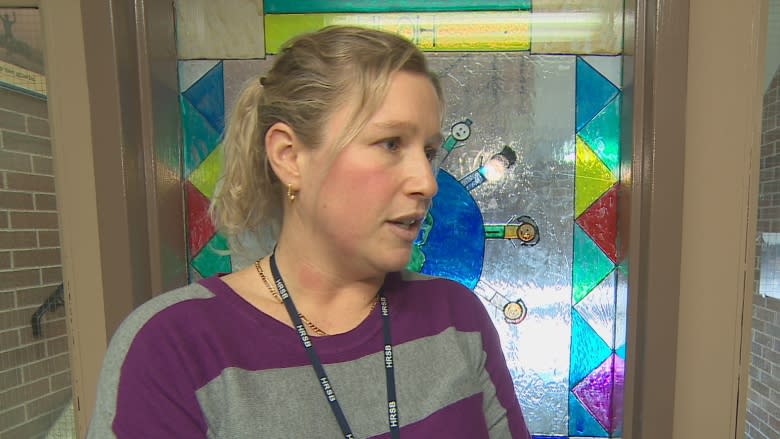Halifax-area school bans cellphones to boost art of conversation
A cellphone detox is underway at Herring Cove Junior High School in Nova Scotia, with students leaving their phones at home for a week as part of a social experiment.
The idea came from teacher Jamie Lynn Quinn. At first, she was just going to do the cellphone detox with her Grade 8 class, but now the whole school is involved.
"They're on their phones all the time, they are Snapchatting and Instagramming continuously during class. There is drama in the classroom because of social media," Quinn said, speaking outside her classroom.
Lack of cellphone anxiety
One thing Quinn discovered on the first day of the experiment; not all students embraced the temporary ban.
"There was major anxiety, and that's one of the components we'll look at. If there was anxiety for the students, how high was it on the first day and does it decrease during the course of the week?"
Of the 220 students who attend the school, a dozen students had their phones confiscated for breaking the ban.
Grade 8 student Erika Keating was one of them.
"I got angry about it. I didn't want to hand it over. I talked back about it. I got like scared. I don't like not being around my phone. I'm so used to it."
Hard to give up cellphones
Some students admitted they spend up to four hours a day on their phones and others said when they get home from school, they headed to their room to chat on their phone rather than talk to their family.
Ethan Campbell had to go to the principal's office to pick up his cellphone. He was caught sending a text.
"It is kind of hard, because you use it for so many things," he said with his phone safely back in his hand.
"I think kids should do other things than just being on their phone."
Cellphone dependency affects people of all ages, said Dr. David Mensink, a psychologist with Dalhousie University's counselling and psychological services.
"From a psychological point of view, people are not talking to each other face to face, so they aren't able to see facial changes as they are speaking to people," he said.
"They are missing out on that behavioural information that they would need to have."
Problem for all ages
The trend is growing and people are becoming used to instant information.
"There is a problem. It's called deferred gratification period. No one thought of this when they created this technology. Because of the instantaneous messaging you are talking about, there is no deferred gratification period," Mensink said.
"It's instant.That's kind of a problem."
Principal Sean MacDonald is curious to see how his school's social experiment goes. He said he's seen the effects of cellphones and social media on student's mental health, and not in a positive way.
MacDonald is interested to see if students are addicted to their phones.
He is hoping for a return to good old-fashioned conversation.
"When I go into the cafeteria, I see students sitting together on their phones and I ask them, can we maybe talk to each other, what's going on?"
'I was talking to people a lot more'
Without her phone, Erika said she was forced to chat during lunch.
"I was talking to people a lot more, because I usually have my phone in my hand, looking down at it."
Quinn has students in one of her Grade 8 classes maintaining a journal and reflecting on having no cellphone in the classroom for four days.
There's also a survey for parents to answer about their child's cellphone usage at home.
Quinn's not sure whether the short ban will have any effect on the students. She's hoping maybe it will make them think twice about the amount of time they spend on their phones.










